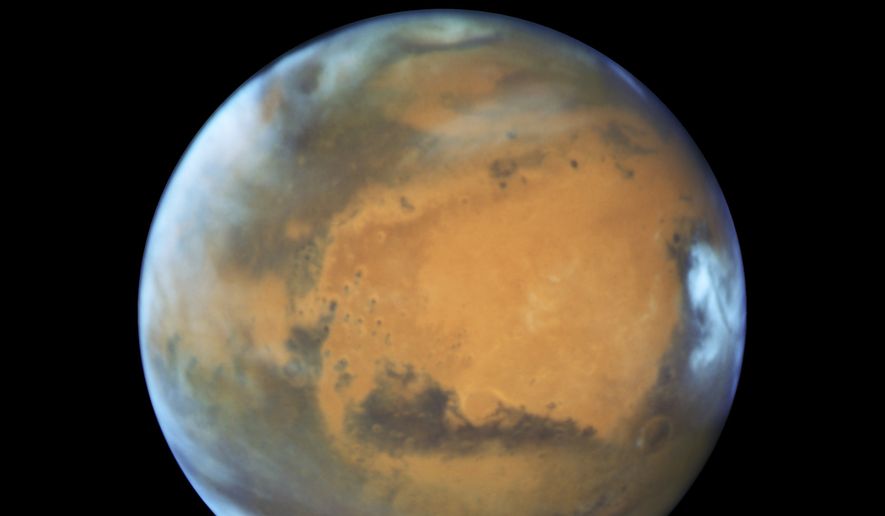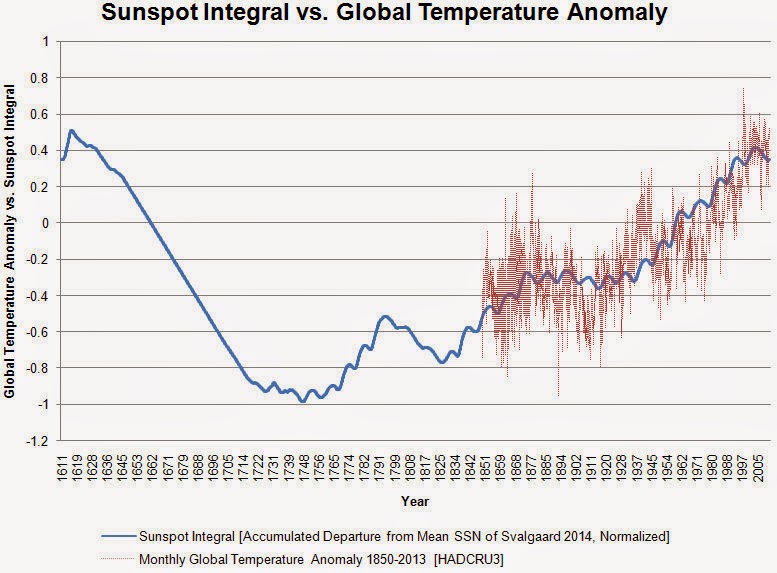How can that be? - There's no humans on Mars to jack up the temperatures...

Scientists find evidence of global warming on Mars
Tuesday, May 31, 2016 - Earth isn’t the only planet grappling with climate change, although this other orb doesn’t have much in the way of fossil fuel emissions or a 97 percent of scientific “consensus” on global warming. Newly published evidence suggests Mars is experiencing global warming as it emerges from an ice age.
See also:
Mars Melt Hints at Solar, Not Human, Cause for Warming, Scientist Says
February 28, 2007 - Simultaneous warming on Earth and Mars suggests that our planet's recent climate changes have a natural—and not a human-induced—cause, according to one scientist's controversial theory.
Scientists find evidence of global warming on Mars
Tuesday, May 31, 2016 - Earth isn’t the only planet grappling with climate change, although this other orb doesn’t have much in the way of fossil fuel emissions or a 97 percent of scientific “consensus” on global warming. Newly published evidence suggests Mars is experiencing global warming as it emerges from an ice age.
The red planet, which moved closer to the Earth on Monday than at any other time since 2005, has retreated from a glacial period that would have covered large areas in white before the thaw about 370,000 years ago, according to a study published Friday in the journal Science. The research was conducted using an instrument on board the NASA Mars Reconnaissance Orbiter that allowed an unprecedented examination of “the most recent Martian ice age recorded in the planet’s north polar ice cap,” according to a NASA press release. Research was led by planetary scientist Isaac B. Smith at the Southwest Research Institute in Boulder, Colorado. “We found an accelerated accumulation rate of ice in the uppermost 100 to 300 meters of the polar cap,” Mr. Smith said in a statement on the SRI website. “The volume and thickness of ice matches model predictions from the early 2000s. Radar observations of the ice cap provide a detailed history of ice accumulation and erosion associated with climate change.”
Mars experiences seasons as does the Earth, resulting in the advance and retreat of carbon dioxide ice and snow over the poles during the Martian year. But the red planet also undergoes larger variations over thousands of years that result in “substantial shifts in the planet’s climate, including ice ages,” said the NASA Mars Exploration statement. NASAattributed the changes to the planet’s orbit and significant tilt. “Earth has similar, but less variable, phases called Milankovitch cycles,” said NASA. “On Earth, ice ages take hold when the polar regions and high latitudes become cooler than average for thousands of years, causing glaciers to grow toward the mid-latitudes,” said NASA. “In contrast, the Martian variety occurs when — as a result of the planet’s increased tilt — its poles become warmer than lower latitudes.” Water vapor moves toward the planet’s equator and forms ice and glaciers at mid-latitudes, said NASA. “As the warm polar period ends, polar ice begins accumulating again, while ice is lost from mid-latitudes. This retreat and regrowth of polar ice is exactly what Smith and colleagues see in the record revealed by the [Shallow Subsurface Radar] images,” said NASA.

This May 12, 2016, file image provided by NASA shows the planet Mars.
While models have predicted the occurrence of ice ages on Mars, “evidence has been scant,” Science said in its description of the study, “An Ice Age Recorded in the Polar Deposits of Mars. “The layers in the upper few hundred meters display features that indicate a period of erosion, followed by a period of rapid accumulation that is still occurring today,” said Mr. Smith. Speculation about climate change on Mars has heightened since 2001 photographs from the Mars Global Surveyor suggested that ice caps near the planet’s South Pole were receding. A 2007 study by Russian physicist Habibullo Abdussamatov concluded that the caps had been in decline for three summers in a row and attributed the decline to solar irradiance. The question of whether Mars is experiencing climate change has spilled into the global warming debate on Earth, fueling discussion over whether both planets are heating up as a result of solar activity.
The consensus view is that the warming trend on the planets is coincidental and that climate change on Earth can be attributed primarily to increased greenhouse-gas emissions in the atmosphere. “Mars and Earth wobble in different ways, and most scientists think it is pure coincidence that both planets are between ice ages right now,” National Geographic News said in a 2007 article. Mr. Abdussamatov has disputed that explanation. “Man-made greenhouse warming has made a small contribution to the warming seen on Earth in recent years, but it cannot compete with the increase in solar irradiance,” he told LiveScience in 2007. In 2014, Kentucky state Sen. Brandon Smith pointed to evidence of warming on Mars as evidence that global warming is being driven by factors other than carbon dioxide emissions, prompting ClimateProgress to declare that “there is absolutely no scientific evidence that one sole instance of melting [on Mars] is the result of a planet-wide trend.” Mars came within 48.6 million miles of Earth at 5:34 p.m. EDT Sunday when Mars and the sun lined up on opposite sides of Earth. The next close encounter is projected for 2018, when Mars is expected to come within 35.8 million miles of Earth, NASA reported.
Mars also undergoing climate change as ice age retreats, study shows
See also:
Mars Melt Hints at Solar, Not Human, Cause for Warming, Scientist Says
February 28, 2007 - Simultaneous warming on Earth and Mars suggests that our planet's recent climate changes have a natural—and not a human-induced—cause, according to one scientist's controversial theory.
Earth is currently experiencing rapid warming, which the vast majority of climate scientists says is due to humans pumping huge amounts of greenhouse gases into the atmosphere. Mars, too, appears to be enjoying more mild and balmy temperatures. In 2005 data from NASA's Mars Global Surveyor and Odyssey missions revealed that the carbon dioxide "ice caps" near Mars's south pole had been diminishing for three summers in a row.
Habibullo Abdussamatov, head of space research at St. Petersburg's Pulkovo Astronomical Observatory in Russia, says the Mars data is evidence that the current global warming on Earth is being caused by changes in the sun. "The long-term increase in solar irradiance is heating both Earth and Mars," he said.
Solar Cycles
Abdussamatov believes that changes in the sun's heat output can account for almost all the climate changes we see on both planets. Mars and Earth, for instance, have experienced periodic ice ages throughout their histories. "Man-made greenhouse warming has made a small contribution to the warming seen on Earth in recent years, but it cannot compete with the increase in solar irradiance," Abdussamatov said. By studying fluctuations in the warmth of the sun, Abdussamatov believes he can see a pattern that fits with the ups and downs in climate we see on Earth and Mars. Abdussamatov's work, however, has not been well received by other climate scientists.
Mars Melt Hints at Solar, Not Human, Cause for Warming, Scientist Says


